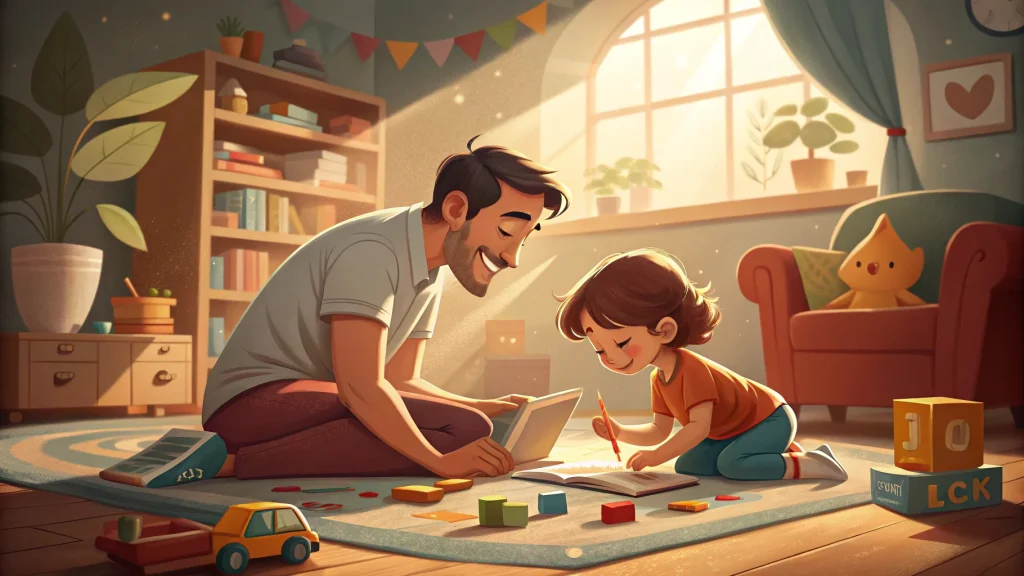When I first held my baby in my arms, I was overwhelmed with love, but also a sense of panic. What if I mess this up? I thought. Parenting felt like stepping onto a stage without a script.
But over time, I realized that being a parent isn’t about perfection—it’s about showing up, being present, and growing alongside your child. That’s what active parenting is all about.
It’s not just about keeping your kids fed and clothed (though that’s important too!); it’s about engaging with them, guiding them, and helping them become the best versions of themselves.
If you’re a new parent, let me tell you: you’re going to make mistakes, and that’s okay. What matters is that you’re there, trying, learning, and loving.
So, grab a cup of coffee (or tea, or whatever keeps you going), and let’s talk about what active parenting really means and how you can make it work for your family.
What Is Active Parenting?
Active parenting is about being intentional and involved in your child’s life. It’s not just reacting to situations as they come up but proactively creating an environment where your child feels loved, supported, and understood.
Think of it as being the director of a movie—you’re not just watching the scenes unfold; you’re shaping the story.
For me, active parenting started with small things. Instead of scrolling through my phone while my toddler played, I got down on the floor and built block towers with him.
Instead of rushing through bedtime, I took a few extra minutes to read a story and talk about his day. These little moments added up, and I began to see how much they mattered—not just to him, but to me too.
Why Active Parenting Matters
Kids are like sponges—they absorb everything around them. The way you talk, the way you handle stress, the way you treat others—they’re watching and learning from it all. Active parenting helps you guide that learning process in a positive way.
Research shows that kids with actively involved parents tend to have better emotional regulation, higher self-esteem, and stronger social skills.
But beyond the studies, it’s about building a deep, meaningful connection with your child. It’s about creating memories and laying the foundation for a lifelong relationship.
Practical Tips for Active Parenting

Now, let’s get into the nitty-gritty. Here are some actionable tips and tricks that have worked for me and might work for you too.
Be Present (Yes, Really)
This one sounds simple, but it’s harder than it seems. Being present means putting away distractions—your phone, your to-do list, your worries—and focusing on your child.
One evening, I was trying to cook dinner while my daughter was telling me about her day. I was half-listening, nodding along, until she said, “Mommy, are you even listening to me?” That hit me hard.
Since then, I’ve made a conscious effort to stop what I’m doing, look her in the eye, and really listen. It’s amazing how much more connected we feel when I do that.
Tip: Set aside dedicated “no-distraction” time each day. Even 15 minutes of undivided attention can make a big difference.
Communicate Openly and Honestly
Kids are curious, and they ask a lot of questions. Instead of brushing them off or giving vague answers, try to engage with their curiosity.
When my son asked me where babies come from, I panicked for a second. But then I took a deep breath and gave him an age-appropriate explanation. It wasn’t perfect, but it opened the door for more conversations as he grows older.
Tip: Use everyday moments as teaching opportunities. Whether it’s a question about the weather or a tough topic like emotions, be honest and keep the lines of communication open.
Set Boundaries with Love
Kids need boundaries—it’s how they learn what’s safe and acceptable. But setting boundaries doesn’t mean being harsh or authoritarian. It’s about guiding them with love and consistency.
When my daughter throws a tantrum because she can’t have candy before dinner, I try to stay calm and firm. “I know you really want the candy, but we eat dinner first.
How about we pick out a piece for dessert?” It doesn’t always work (hello, toddler meltdowns!), but over time, she’s starting to understand the routine.
Tip: Use positive language when setting boundaries. Instead of saying, “Don’t run,” try, “Let’s walk inside so we stay safe.”
Encourage Independence
As much as we want to protect our kids, part of active parenting is helping them learn to do things on their own. It’s hard to step back sometimes, but it’s so important for their growth.
I’ll never forget the first time I let my son pour his own milk. It was messy, and half of it ended up on the table, but the look of pride on his face was worth it. Now, he insists on doing it himself every morning, and he’s getting better at it every day.
Tip: Give your child age-appropriate tasks and responsibilities. Whether it’s picking out their clothes or helping set the table, it builds confidence and life skills.
Model the Behavior You Want to See
Kids learn more from what you do than what you say. If you want them to be kind, patient, and respectful, show them how it’s done.
I’ll admit, I’m not always the most patient person. But when I catch myself getting frustrated, I try to take a deep breath and handle the situation calmly. It’s not easy, but I’ve noticed that my kids are more likely to stay calm when I do.
Tip: Be mindful of your actions and reactions. Your kids are always watching, so let them see the best version of you.
Make Time for Fun
Parenting isn’t all about rules and routines—it’s also about having fun together. Whether it’s a silly dance party in the living room or a family game night, these moments create joy and strengthen your bond.
One of my favorite memories is the time we had an impromptu picnic in the backyard. It wasn’t fancy—just sandwiches and a blanket—but the kids loved it. We laughed, told stories, and just enjoyed being together.
Tip: Don’t overthink it. Sometimes the simplest activities are the most meaningful.
The Challenges of Active Parenting
Let’s be real—active parenting isn’t always easy. There are days when you’re exhausted, when the kids are pushing every button, and when you feel like you’re failing. I’ve been there, and I want you to know: it’s okay.
Parenting is a journey, and there will be ups and downs. What matters is that you keep trying, keep learning, and keep loving.
A Motivational Note for You
If you’re reading this, you’re already on the right track. You care deeply about your child, and that’s the most important part of active parenting. Remember, you don’t have to be perfect—you just have to be present.
There will be days when you feel like you’ve got it all together and days when you feel like you’re barely holding on. Both are part of the process. Celebrate the wins, learn from the challenges, and give yourself grace.
Final Thoughts
Active parenting is a journey, not a destination. It’s about showing up, day after day, and doing your best to love and guide your child. It’s about creating a home filled with warmth, laughter, and connection.
So, take a deep breath, trust your instincts, and enjoy the ride. You’ve got this.
Parenting Quote to Inspire You:
“Children are not a distraction from more important work. They are the most important work.” – C.S. Lewis
What’s one small way you can be more present with your child today? Share your thoughts or experiences in the comments below—I’d love to hear from you!


